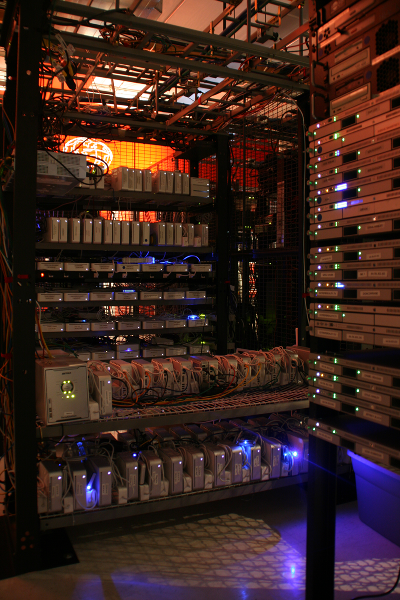
The Singularity Hub posts on a new program that can churn out sports news stories:
Called Stats Monkey, the new computer software analyzes the box scores, and play by plays to automatically generate the news article. It highlights key players and clutch plays and will even write an appropriate headline and find a matching photo for a [key] player!… [I]t could work for every sport humans like to read about. Moreover, Stats Monkey could be adapted to write business stories, or conference updates, or other forms of professional journalism that rely heavily on numbers and analytics. Writing, it seems, is no longer immune from automation.
Robotic sports journalists will make a nice complement to robotic athletes. Now all we need are robotic spectators! Human inefficiency could be removed from sports altogether, and then we could wonder at the technical prowess of games just as we marvel at the skills of server stacks:
And hey, if things really work out, soon we won’t need humans for writing Singularity blogs either.

Futurisms
November 11, 2009


Disgusting critic. What point are you trying to make?
You dislike the idea of having automated stat tracking? You prefer having a human manually counting the passes and the scores?
What would you think if I told you they write their article on a computer? Would you also say they are cheating and should write them by hand?
Anyway.. I still don't get your point.
Dear Simon –
You seem to have misunderstood not just Ari's sarcastic joke, but also the point of the news article he quoted. That article is not just about "stat tracking," but rather about converting those stats into news stories, and thus possibly replacing human journalists.
Whether or not you agree with Ari's post, at least it makes sense. Your comment, on the other hand, is a non sequitur — and it is rude. You should be embarrassed.
ATK
Oh, you're against the idea that some machines do the journalist's job. It's clearer now. Thanks for transforming the sarcastic joke into something of value.
I still disagree with the assumption however. Because, you know, there's also people working to build these automated systems. There would also be people needed to proof-read and make sure everything is alright before publishing.
This post reminds me of a story from the life of Ronald Reagan. Long before he was president, even before his career in acting, Reagan was a sports broadcaster. One of his earliest jobs after college was at radio station WHO in Des Moines, Iowa. His broadcasts of Chicago Cubs games were heard through much of the Midwestern United States in the mid-1930s.
What's interesting is how those broadcasts worked. Reagan was not broadcasting live from the site of the baseball games. For each game he announced, he sat in the booth at the station in Des Moines and received a steady stream of updates via telegraph. He was given the raw statistics and would add most, perhaps all, of the commentary himself. So while the telegraphed messages might tell him who was on base and who was at bat, Reagan would describe — that is, he would make up — what the pitcher looked like, how the batter acted between pitches, what the crowd sounded like, even details about the weather. If there were delays between telegraph messages, he would have to ad lib — sometimes for many minutes at a time.
To captivate an audience the way Reagan's broadcasts did required an imagination and a talent for storytelling. Of course it will be possible for computer programs to stitch together descriptions of sporting events based on the barebones stats. But will such descriptions be worth reading? Won't they be missing the human element — the part that innately understands "the thrill of victory, and the agony of defeat; the human drama of athletic competition"?
That is another story. It *might* be different from a real sport journalist. If that is the case, the technology won't work. A lot of people are passionate about their sports and if a newspaper or a news website start posting boring news, people will just go see elsewhere. However, if a website can broadcast real-time statistic tracking and news article on a match, it suddenly becomes interesting.
AS you said, the article would need to be of good quality to be even considered as a replacement. There's a lot of money at stakes in using this kind of technology.
Contrast this article to the opening paragraphs of the essay High Challenge in the transhumanist-authored Fun Theory sequence on Less Wrong:
***
There's a class of prophecy that runs: "In the Future, machines will do all the work. Everything will be automated. Even labor of the sort we now consider 'intellectual', like engineering, will be done by machines. We can sit back and own the capital. You'll never have to lift a finger, ever again."
But then won't people be bored?
No; they can play computer games – not like our games, of course, but much more advanced and entertaining.
Yet wait! If you buy a modern computer game, you'll find that it contains some tasks that are – there's no kind word for this – effortful. (I would even say "difficult", with the understanding that we're talking about something that takes 10 minutes, not 10 years.)
So in the future, we'll have programs that help you play the game – taking over if you get stuck on the game, or just bored; or so that you can play games that would otherwise be too advanced for you.
But isn't there some wasted effort, here? Why have one programmer working to make the game harder, and another programmer to working to make the game easier? Why not just make the game easier to start with? Since you play the game to get gold and experience points, making the game easier will let you get more gold per unit time: the game will become more fun.
So this is the ultimate end of the prophecy of technological progress – just staring at a screen that says "YOU WIN", forever.
And maybe we'll build a robot that does that, too.
Then what?
***
The fair-minded reader is asked to judge for themselves whether, in fact, these critiques are new and shocking to transhumanists; or if, as transhumanists claim, these objections are old hat to us – worth answering, definitely, worth actually dealing with in some fashion, but hardly stumpers. And with existing answers, so that to present the critique without mentioning our answers is hardly fair play.